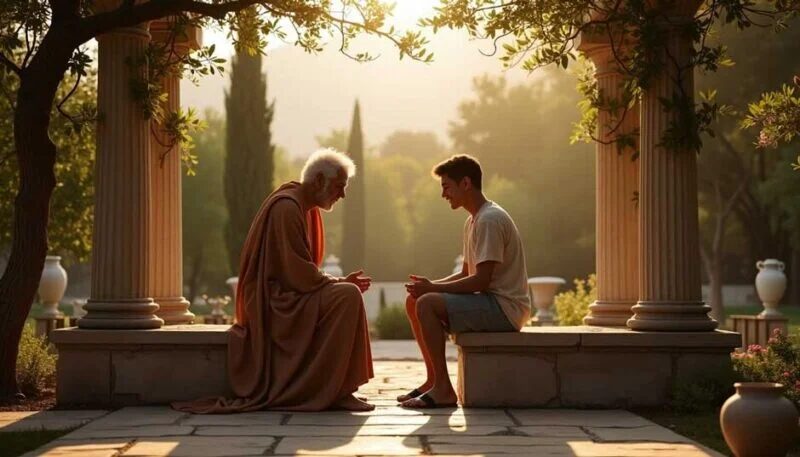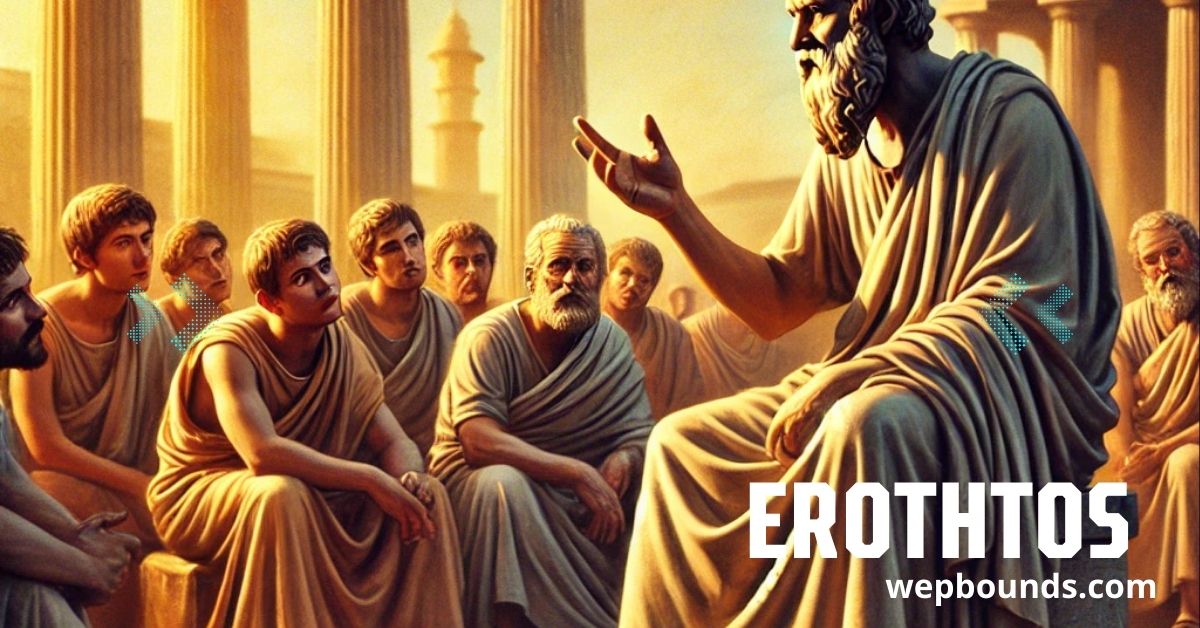In the heart of Ancient Greek philosophy lies a powerful tool of learning and discovery: erothtos. This concept is not just about asking questions—it’s about asking the right questions in a way that uncovers truth, promotes learning, and helps people think deeply.
Erothtos played a key role in how the greatest minds of Ancient Greece, like Socrates, understood the world. Through erothtos, they shaped the way we learn, debate, and search for meaning, even today. This article explores the origin, development, use, and modern relevance of erothtos in a simple, easy-to-follow way.
What is Erothtos?
The word erothtos comes from the Greek word erotao, which means “to ask.” Erothtos is not just a normal question—it is a method of critical thinking. It is a technique where one person asks deep and thoughtful questions to guide another person toward discovering answers for themselves.
It’s more than curiosity—it’s a powerful way of thinking. The idea behind erothtos is that by asking good questions, we can:
- Understand ourselves better
- Challenge our own beliefs
- Find truth and wisdom
The History and Origins of Erothtos
Erothtos is deeply connected to Ancient Greek philosophy. It was a method used by the famous philosopher Socrates, who lived in Athens around 470–399 BCE. Socrates didn’t write books. Instead, he walked around the city asking people questions—questions that made them stop, think, and reflect.
This method became known as the Socratic Method, which is based entirely on erothtos. Socrates believed that knowledge came from within and that asking the right questions could help people find it.
Many of his students, including Plato, later wrote about these conversations. Thanks to them, we still have a record of how Socrates used erothtos to change the world.

Erothtos and the Socratic Method
Erothtos is the foundation of the Socratic Method, a teaching style based on dialogue and questioning. Here’s how it works:
- A person makes a statement or claim.
- The teacher or questioner (like Socrates) asks a series of questions.
- Each question challenges the original idea.
- Slowly, through answering, the person starts to understand the topic more deeply.
- This leads to either a new understanding or the realization that the original idea was flawed.
This style of questioning teaches people to think critically. It avoids simple “yes” or “no” answers and instead encourages deeper exploration.
Also Read: Is Gestoexcroseboly Safe? Complete Guide for Everyone
Example of Erothtos in Action
Imagine someone says: “Justice means helping your friends and hurting your enemies.”
A Socratic response using erothtos might ask:
- What do you mean by “justice”?
- Is it always right to hurt your enemies?
- What if your enemy is actually a good person?
- Can justice include harm?
By continuing this questioning, the speaker is forced to think more clearly about what justice really means.
Erothtos in Ancient Greek Education
In Ancient Greece, erothtos wasn’t just used in philosophy—it was used in education too. Teachers and philosophers didn’t just give answers. They helped students discover knowledge through questioning.
This made learning active instead of passive. Students became thinkers, not just listeners.
Erothtos encouraged students to:
- Use logic
- Think for themselves
- Understand complex ideas
- Question everything—even the teachers
This was revolutionary and is still considered a strong teaching method today.
Why Erothtos Still Matters Today
Though it’s ancient, erothtos is still important in the modern world. Here are some reasons why:
1. Critical Thinking in Modern Education
Many schools and universities around the world use the Socratic Method, especially in law, philosophy, and ethics classes. Erothtos helps students to:
- Argue both sides of an issue
- Understand difficult topics
- Think independently
2. Helping in Everyday Life
We all face hard questions every day. Using erothtos, we can ask ourselves:
Also Read: Toexcrosebolykaihaz: Understanding Its Cultural, Philosophical, and Scientific Significance
- Why do I believe this?
- What evidence do I have?
- What if I’m wrong?
These types of questions help us become better decision-makers, friends, and even citizens.
3. Better Communication
Asking the right questions makes us better listeners and communicators. Whether in personal relationships or at work, erothtos can:
- Solve misunderstandings
- Build stronger connections
- Encourage empathy and respect
Erothtos and Western Thought
The influence of erothtos doesn’t stop in Greece. It shaped Western philosophy, science, and democracy. Here’s how:
In Philosophy
Many Western thinkers, from Descartes to Nietzsche, used questioning to challenge old ideas and create new ones. Their work was built on the same questioning spirit as erothtos.
In Science
Science depends on asking the right questions:
- What is causing this?
- How can I prove it?
- What if I try something different?
These are all forms of erothtos. Without questioning, there would be no science.
In Politics and Democracy
Democracy is based on free speech, debate, and open discussion. Erothtos supports all of these by promoting dialogue and understanding. It helps people speak up, challenge authority, and find better solutions together.
Erothtos in Religion and Ethics
Religion and ethics often deal with complex and personal questions. Erothtos has played a big role in helping people think through:
- What is good and bad?
- What is the meaning of life?
- Is there a God?
By asking such questions, people explore their own beliefs and become more thoughtful about how they live.
Also Read: Zoracirulfit: Everything You Need to Know
Erothtos vs. Modern Questioning
Today, we ask questions all the time—on Google, in school, or in conversation. But not all questions are erothtos.
What Makes a Question Part of Erothtos?
- It’s open-ended (not yes/no)
- It leads to deeper thinking
- It challenges assumptions
- It invites dialogue
In contrast, a modern question like “What time is it?” is about getting information. Erothtos is about understanding meaning.
Erothtos in the Digital Age
In the modern world full of technology and social media, erothtos is more needed than ever. With so much misinformation, fake news, and shallow thinking, we need tools to help us dig deeper.
Using erothtos online can help people:
- Check facts before sharing
- Think critically about social issues
- Understand different viewpoints
- Avoid echo chambers
Even chatbots and AI systems, like the one you’re reading now, are built on ideas inspired by erothtos: asking, analyzing, and learning from questions.
Benefits of Practicing Erothtos
Here are some real-life benefits of applying erothtos:
- Improved Thinking: You become sharper and more logical.
- Better Decisions: You question before acting, which leads to wiser choices.
- Stronger Relationships: You learn to ask, not just talk.
- More Wisdom: You see the world from many angles.
How to Use Erothtos in Daily Life
Here’s a simple way to use erothtos every day:
- Start with a belief or opinion.
- Ask questions like:
- Why do I believe this?
- What is the opposite view?
- What proof do I have?
- What would a wise person say?
- Why do I believe this?
- Be open to answers.
- Repeat.
Over time, you’ll find yourself thinking more deeply and clearly.
Also Read: Niderzinxosnon: A New Approach to Life and Technology
Frequently Asked Questions (FAQs)
What is erothtos in simple terms?
Erothtos means asking deep and meaningful questions that help people think and understand better.
Is erothtos the same as the Socratic method?
Yes, the Socratic method is based on erothtos. It’s a style of teaching and learning through thoughtful questions.
Why is erothtos important today?
Erothtos helps people think clearly, make better decisions, and understand others. It’s useful in education, relationships, and even politics.
Who used erothtos first?
Socrates, the ancient Greek philosopher, is the most famous user of erothtos.
Can I use erothtos in daily life?
Absolutely. Anyone can use erothtos by asking good questions about their thoughts, choices, and beliefs.
Is erothtos only for philosophers?
No, erothtos is for everyone. It’s a tool that helps all people—students, teachers, leaders, and everyday thinkers.
Conclusion: The Power of Erothtos
Erothtos is not just a historical idea—it is a living method that continues to shape how we think, learn, and live. From Ancient Greece to today’s classrooms and online conversations, erothtos remains one of the most powerful tools for discovering truth.
By practicing erothtos, we don’t just collect facts—we grow wiser. We learn how to ask, reflect, and truly understand. In a world that often rushes to answer, erothtos reminds us of the value of a good question.








Leave a Reply